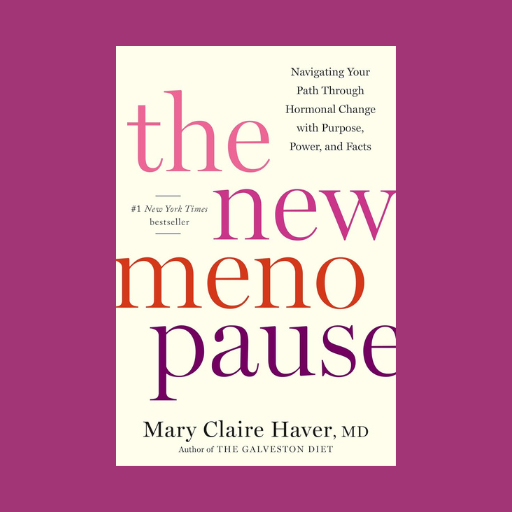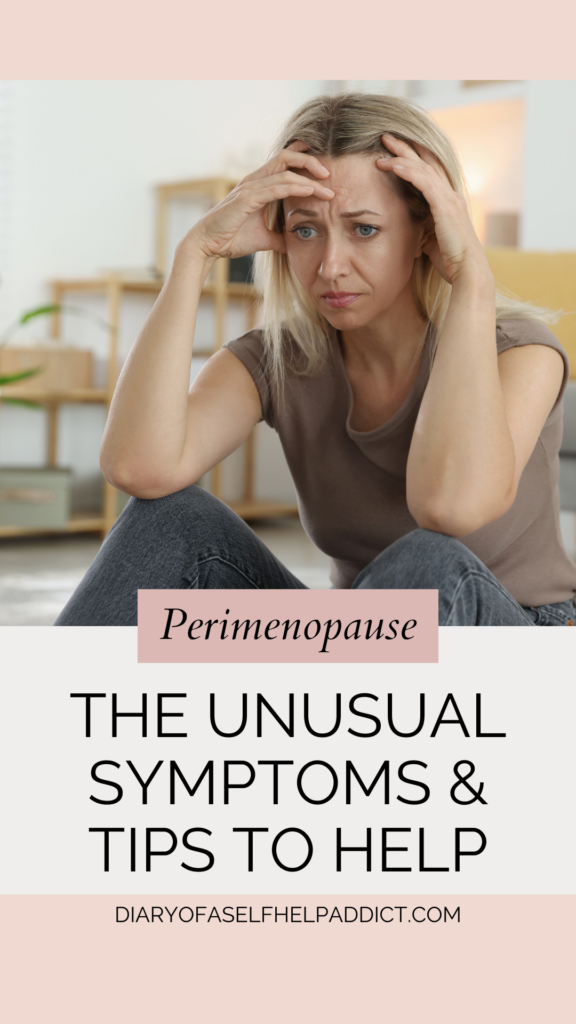
Let’s start with something that surprises almost everyone: menopause is just one day. That’s right. Menopause isn’t a long, drawn-out process like we’re led to believe. It’s the single day marking one year since your last menstrual period. Everything before that day? That’s perimenopause (or pre-menopause). Everything after? That’s post-menopause.
Now, here’s the kicker—perimenopause can start up to 10 years before menopause actually hits. That means your 30s or early 40s might already be the beginning of this hormonal rollercoaster. And while most of us expect the big ones (hello, hot flashes), there are a whole host of weird and unexpected symptoms that can show up and leave you wondering if you’re going crazy. Spoiler alert: you’re not.
I’ve personally been riding the perimenopause wave for years. I’ve experienced some of the more “textbook” signs—but also some of the strangest ones, like my second frozen shoulder (yes, seriously). In this blog post, I want to break down some of the less-talked-about symptoms and share what you can do about them, including resources that have helped me tremendously.
Unusual Symptoms of Perimenopause
These are just some of the more unusual or lesser-known symptoms you might experience:
- Frozen Shoulder – Perimenopause can increase inflammation in the body and affect connective tissues.
- Body Odor – Hormonal changes can lead to shifts in your natural scent. What used to work as deodorant might suddenly fall short.
- Burning Tongue – A strange, tingling, or burning sensation in your mouth that seems to come from nowhere? Yep, that can be perimenopause too.
- Tinnitus – Ringing in the ears with no apparent cause? Estrogen fluctuations can mess with your auditory system.
- Cold Flashes – Not just hot flashes! Cold flashes can hit out of nowhere and leave you shivering.
- Dizziness – Lightheadedness or vertigo can be triggered by hormonal changes affecting your vestibular system.
- Heart Palpitations – Feeling like your heart is skipping a beat? It might not be anxiety or caffeine—just your hormones doing their thing.
- Brittle Nails – Your nails may start cracking, splitting, or feeling weaker as estrogen levels dip.
- Dry Eyes – Not just an allergy thing. Hormonal shifts can reduce tear production, causing dry or irritated eyes.
- Hair Loss – Thinning hair or more shedding in the shower? Estrogen and progesterone drops affect your hair growth cycle.
- Hot Flashes – The most well-known symptom, but still wildly unpleasant.
- Irregular Menstruation – Your cycles might shorten, lengthen, or disappear altogether.
- Sleep Disturbances – Waking up at 3am for no reason? Fun.
And the list goes on….
- Tingling in the Extremities – Pins and needles unrelated to position or compression? Hormonal shifts can mess with your nerves.
- Urinary Tract Infections (UTIs) – Increased vulnerability due to thinning vaginal and urethral tissue.
- Gum and Teeth Problems – Bleeding gums, increased sensitivity, or receding gum lines.
- Itchy Skin – Estrogen helps with collagen and moisture; its loss can lead to dry, itchy, irritated skin.
- Memory Problems – Can’t remember why you walked into the room? That’s not just “mom brain” anymore.
- Mood Swings – Big emotions. All the time. With or without a clear trigger.
- Tender Breasts – Hormonal surges can cause breast tenderness even without a cycle.
- Vaginal Dryness – This can affect comfort, intimacy, and even UTIs.
- Weight Gain – Especially around the middle. Ugh.
- Allergies – Some women find their seasonal or food sensitivities worsen.
- Bigger Breasts – And not always in a good way. This can be painful and frustrating.
- Brain Fog – Trouble focusing, forgetting words, or zoning out mid-task.
- Bone and Joint Pain – Aches, stiffness, or sudden joint discomfort are common and can be tied to decreased estrogen levels.
Related Read: Musculoskeletal Syndrome of Menopause: What You Need to Know
What You Can Do About It
First things first: you’re not alone. These symptoms are real, they’re valid, and you deserve answers. Here’s what I recommend:
1. Start Tracking Your Symptoms
Log your physical, emotional, and mental changes using an app or a journal. This will help you connect the dots and bring useful information to your doctor.
2. Do Your Research
The internet can be overwhelming, but there are some goldmine resources out there. My personal favorite? Dr. Mary Claire Haver and her site ThePauseLife.com.
Dr. Haver is a board-certified OB/GYN and menopause specialist who makes the science easy to understand and actionable. Her book, The New Menopause, is a fantastic read.
Check out her book here: The New Menopause on Amazon

AS AN AMAZON ASSOCIATE, I EARN FROM QUALIFYING PURCHASES. READ MY DISCLOSER HERE. THANK YOU FOR SUPPORTING MY SMALL BUSINESS!
Her website is packed with tools, including:
- How to talk to your doctor about perimenopause
- What HRT (hormone replacement therapy) actually is
- Who is a candidate for treatment
- Symptom checklists
- Lifestyle changes that help
3. Find a Knowledgeable Doctor
This can be tricky, but it’s crucial. Not all doctors are trained in menopause management. You can start with your OB/GYN or PCP, but be prepared to advocate for yourself. If they dismiss your symptoms, keep looking.
Again, Dr. Haver’s website has a directory and guidance on how to have that conversation.
4. Try a Telehealth App for Menopause Care
Recently, I started using MyAlloy.com, and I am very impressed.
Here’s how it works:
- You pay $49 to join and fill out a detailed questionnaire.
- A licensed doctor reviews your answers and medical history.
- If you’re a good candidate for HRT, they give you options.
- You choose your prescription plan, and they ship a 3-month supply to your door.
- No insurance is needed (but HSA is accepted!).
- Free shipping, cancel anytime, and fast messaging support from your doctor.
They even respond quickly when you have questions (which we all know isn’t always the case with traditional offices).
You can use my discount code, KELLY95464, for $25 off your first purchase. (I’m not an affiliate—just a happy customer!)
Kelly’s Thoughts
If you’re dealing with any of these weird, frustrating, and seemingly unrelated symptoms—you are not losing it. You’re probably just entering perimenopause, and it’s time we start talking about it more openly.
Educate yourself, advocate for your health, and don’t be afraid to ask for help. Real solutions are out there—from lifestyle tweaks to supplements to hormone therapy. You just have to find what works best for you.
And remember, it’s okay to grieve the change, feel frustrated, or be totally confused. This is a big transition, but you’re not alone—and now, you’re armed with information.
Let’s normalize the conversation about perimenopause, one hot (or cold) flash at a time.
Pin it for later


Good info! Some of these symptoms just aren’t talked about as potentially related to perimenopause, but they seem to be so common! Good to consider what might be going on and maybe be able to get some help. Or at least understand better.
Right?! I’m glad the info is becoming more available. Thank you!
GREAT topics and so helpful ! Have you heard of Lara Briden? Hormone repair manual is a super helpful read.
Oooh, no I haven’t! But I will check her out. Thank you!
This has been a recent battle for me! Thanks for sharing tips!
You’re welcome!
Great resources to navigate large changes. That’s crazy about frozen shoulder! Good to know!
Girl- frozen shoulder is no joke! Thanks for your comment!
Wow I’ve never heard of burning tongue as a symptom of perimenopause! Thanks for the info!
Isn’t that crazy?!?! Thanks for your comment!
Great post! I’m so glad there is more information available on perimenopause these days. Thank you for sharing!
Thank you for your kind words!